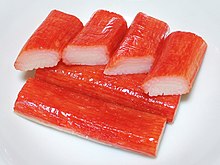Imitation crab

Crab sticks – imitation crab meat surimi.
|
|
| Alternative names | imitation crab meat, seafood sticks, krab |
|---|---|
| Place of origin | Japan |
| Main ingredients | white fish |
| |
|
Crab sticks, krab sticks, imitation crab meat or seafood sticks are a form of kamaboko, a processed seafood made of starch and finely pulverized white fish (surimi), shaped and cured to resemble the leg meat of snow crab or Japanese spider crab.
Sugiyo Co., Ltd. (? Sugiyo) of Japan first produced and patented imitation crab meat in 1973, as Kanikama. This was a flake type. In 1974, Osaki Suisan Co., Ltd., of Japan first produced and patented imitation crab sticks.
In 1976, The Berelson Company of San Francisco, California, US, working with Sugiyo, introduced them internationally. Kanikama is still their common name in Japan, but internationally they are marketed under names including Krab Sticks, Ocean Sticks, Sea Legs and Imitation Crab Sticks. Legal restrictions now prevent them from being marketed as "Crab Sticks" in many places, as they usually do not have crab meat.
Alaska pollock (Theragra chalcogramma) from the North Pacific is commonly the main ingredient, often mixed with fillers such as wheat, and egg white (albumen) or other binding ingredient, such as the enzyme transglutaminase. Crab flavoring is added (artificial) and a layer of red food coloring is applied to the outside.
...
Wikipedia
